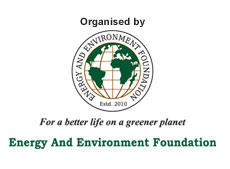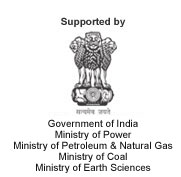Oil contaminated solid waste, generated by the oil and gas industries in the form of oily sludge, oil soaked soil, drill cuttings and oil spills on land, etc., cause a major threat to the environment as their constituents are hazardous and mainly toxic, mutagenic and carcinogenic. None of the available conventional methods are permanent ecofriendly disposal solution for the said waste. Biological methods have been acknowledged for remediation of environments contaminated with petroleum hydrocarbons. The Energy and Resources Institute (TERI), India, has developed an indigenous microbial consortium by assembling four different bacterial species, isolated from various oil contaminated sites of India, which could biodegrade different fractions of total petroleum hydrocarbon (TPH) of the oily waste. The end product of the process, named bioremediation, is CO2, water and dead biomass which is environment friendly. The present paper describes large scale bioremediation case studies, in field, with total 34,597 tonnes (t) of oil contaminated solid waste using the said microbial consortium in 62 different batches at five different oil installations located at assorted arid zones in India. The different batch sizes were decided based on the availability of the oily waste to be undertaken for bioremediation at the respective oil installations.
At Panipat refinery of Indian Oil Corporation limited (IOCL), sub-tropical and semi arid climate, 3,333 t of light crude oily sludge was bioremediated in 7 batches where the initial TPH content of 206.50 – 238.00 g/kg waste was biodegraded to 2.60 – 8.00 g/kg waste in 3 – 10 months per batch. At IOCL Gujarat refinery, semi-arid & tropical savanna climate, 11,500 t of light crude oily sludge was treated in 7 batches where the initial TPH content of 132 – 270 g/kg waste was biodegraded to 3.90 – 34.50 g/kg waste in 2 – 12 months / batch. At Mehsana Asset of Oil and Natural Gas Corporation limited (ONGC), semi-arid & extreme dry or semi dry climate, bioremediation of 16,938 t of heavy viscous asphaltic crude oily sludge was carried out in 42 batches where the initial TPH content of 69.20 - 475.40 g/kg waste was biodegraded to 5.80 - 15.00 g/kg waste in 4.5 – 33 months per batch. At Barmer field, Rajasthan, of Cairn Energy Pty India Ltd., fully arid zone, 641 t of oil contaminated drill cuttings was undertaken for bioremediation in 3 different batches in 3 - 4 months where the initial TPH of 98.10 - 188.10 g/kg waste was biodegraded to 8.20 – 10.90 g/Kg waste. At Bhavanagar site of Gujarat of BG Exploration and production India Ltd., semi-arid & fairly humid coastal climate, 2,185 t of oil contaminated drill cuttings were bioremediated in 3 different batches in 4 – 7.4 months time per batch where the initial TPH of 57.50 - 106.70 g/kg waste was biodegraded to 2.60 - 6.90 g/Kg waste. The average biodegradation rate in all the said locations varied from 0.10 – 0.61 Kg TPH /day/m2 area which was also depending upon type of waste, area of treatment site, depth of contamination in the site and also in few places seasonal rains from time to time which has hampered the execution process. The similar reason was observed for the variation in time, 2 – 33 months, required for completion of the bioremediation process in each batch. Also in fully arid zone, the biodegradation rate was found to be the highest, which indicates that the arid climate favors bioremediation process using the selected microbial consortium. The bioremediated soil was non-toxic and natural vegetation was found to be grown on the soil after bioremediation. Seed germination index was found to be improved in the soil after bioremediation. In few cases, rehabilitation of the bioremediated soil was successfully carried out by growing local plant species. Successful fish cultivation was done in one oil contaminated large effluent pit of 26,000 m2 area after bioremediation at ONGC Mehsana Asset. Bioremediation technology has helped various oil industries for the management of their hazardous oily wastes in a sustainable environment friendly manner. Similar biotechnological treatment option can be developed for management of solid waste generated by mining industries, acid mine drainage and eco-restoration of mining degraded agricultural land in an environment friendly manner.
KEYWORDS: Arid zones, Biodegradation, Bioremediation, Oily waste, Total Petroleum Hydrocarbon.
|







